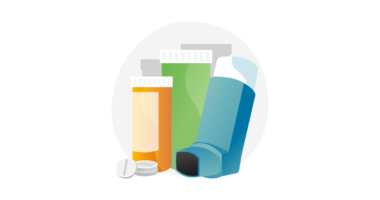Artificial Intelligence (AI) has grown increasingly ubiquitous, promising transformative potential across the health care system, including for the practice of allergy. Both allergists and payers stand to benefit from this technology and its decision-optimizing capabilities. However, as with any technological advancement, the integration of AI into allergy practice raises serious risks and a need for regulation.
Opportunities
Allergists can leverage AI to improve patient care. One significant advantage is the ability to predict health outcomes with greater accuracy. By analyzing vast datasets encompassing patient histories, environmental factors, and treatment responses, AI algorithms can help allergists prevent disease, as well as diagnose and treat patients with more precision. For example, when an asthma diagnosis is uncertain, AI can help providers identify which patients with respiratory symptoms do indeed have asthma. Moreover, employing AI in clinical allergy research can improve understanding of disease pathogenesis, diagnostic accuracy, therapeutic approaches, and drug discovery. It can also facilitate the assimilation of medical literature into clinical practice more expeditiously. AI also can alleviate the administrative burdens of providers by automating or streamlining routine administrative tasks.
Risks
While the benefits are significant, the use of AI introduces noteworthy risks. Liability resulting from inaccurate AI models or their misuse raises questions surrounding risk. Liability frameworks under product liability law, medical malpractice law, and ordinary negligence will likely provide a lens for understanding these concerns in the years to come. It is important that AI be used to supplement, not replace, the practitioner’s experience and expertise.
In addition, because AI tools are trained on real-world or human-generated data, the risk that bias will inform an AI model’s outputs is unavoidable. Such biases can further exacerbate health inequities. It will be essential for the design, training, and use of AI models to account for such biases.
AI also poses serious privacy and security concerns. While HIPAA protects individually identifiable health information, it was implemented before AI had been integrated into medical practice. Few safeguards exist to govern how data utilized in AI tools or to train AI models is used and reused. In addition, concerns abound about how AI may be able to re-identify information about patients that has been previously de-identified.
AI tools will continue to offer important benefits to allergists that could one day revolutionize the field, but the risks arising from these capabilities emphasize why AI – at least currently –should not function independently in a clinical setting.
Payers
In the payer context, AI similarly presents a double-edged sword. AI technology can make claims processing more efficient by automating call center interactions, preauthorizations, and claims denials and appeals. AI also enables payers to conduct more nuanced analyses of health care utilization patterns and cost drivers. While these benefits hold promise, payers have already demonstrated a propensity to use AI to improperly expedite claims processing, undermine physician judgment, and circumvent established coverage criteria.
For example, class action lawsuits against both UnitedHealth Group and Humana allege that the payers’ use of an AI tool called ‘nH Predict’ systematically denies elderly patients’ claims for extended care, such as nursing facility stays. The lawsuit alleges the model has a 90% error rate and overrides physicians’ medical judgments, resulting in denials of care to patients on the companies’ Medicare Advantage plans. Just like AI implementation in the clinical setting, AI is not yet a silver bullet for achieving seamless efficiency among payers.
Regulatory initiatives
Regulation is essential for balancing the immense potential of AI with its serious risks. To date, there is no comprehensive federal legislation dedicated to this rapidly growing area of technology; however, President Biden published an Executive Order in 2023 calling for the safe, secure, and trustworthy development and use of AI in health care. The Executive Order directed the HHS to create a comprehensive plan for assessing AI before it goes to market and for monitoring performance and quality once the technology is in use.
Last February the Health Data, Technology, and Interoperability: Certification Program Updates, Algorithm Transparency, and Information Sharing Final Rule (HTI-1) went into effect. This Final Rule requires health IT developers to make certain information about AI used in electronic health records (EHRs) available to clinicians.
In March the Office of Management and Budget (OMB) issued a binding memorandum titled “Advancing Governance, Innovation, and Risk Management for Agency Use of Artificial Intelligence.” The OMB policy establishes requirements for each federal agency to strengthen AI governance, advance responsible AI innovation, and manage risks from the use of AI.
Congress has demonstrated its commitment to understanding and regulating this area. Legislators are regularly issuing Requests for Information from stakeholders on AI and conducting numerous hearings on the subject, including a recent one titled “Artificial Intelligence and Health Care: Promise and Pitfalls.” State legislative activity surrounding AI has also accelerated in recent years.
We will continue to monitor the AI regulatory landscape and will update members on important changes.
The Advocacy Council – ADVOCATING FOR ALLERGISTS AND THEIR PATIENTS.




